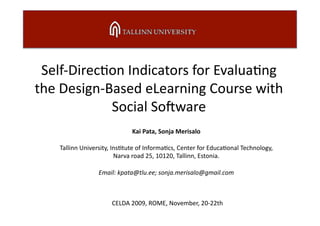
Self-direction indicators
- 1. Self‐Direc*on Indicators for Evalua*ng the Design‐Based eLearning Course with Social So<ware Kai Pata, Sonja Merisalo Tallinn University, Ins*tute of Informa*cs, Center for Educa*onal Technology, Narva road 25, 10120, Tallinn, Estonia. Email: kpata@tlu.ee; sonja.merisalo@gmail.com CELDA 2009, ROME, November, 20‐22th
- 2. New learning context • In the context of life‐long learning it makes sense for learners to target the Instruc*onal Designs towards their own needs. • Maintaining Personal Learning Environments (PLE) can offer learners the opportunity to plan their own learning trajectory and enter to different collabora*ve learning ac*vi*es. • The design process enables the development of self‐direc*on and self‐reflec*on habits as part of the design process.
- 4. Outline of an eLearning course COMPOSING PLE SELF‐REFLECTIONS INTEGRATING 55 students from GROUP PLEs 10 interna*onal Personal learning universi*es PLANNING THE contract reflected weekly GROUPWORK through a reflec*on template during E‐LEARNING the 14 weeks COURSE course. PROTOTYPE Personal learning contract GROUPWORK INDIVIDUAL WORK
- 5. Problem • It is important to find methods of evalua*ng learning process with personal learning environments using unobtrusive methods. Goal • The development of self‐direc*on indicators for evalua*ng the e‐learning course using students‘ self reflec*ons in blogs.
- 6. Weekly reflec*on templates • Ques*ons: – What was the most important thing you learned this week? – What was par*cularly interes*ng/boring in this week? – Was there something you did not quite understand and want to know more about it? – What kind of ques*ons/ideas/experiences this week's ac*vi*es raised for you? – Which tools did you use this week? Explain what was the purpose of using these tools (e.g. social talk, to regulate my team ac*vi*es, to work on my documents)? – With whom did you communicate during this week, how many *mes, with which tools, and for what purposes?
- 7. Research ques*ons • Which are the indicators of the self‐direc*on in students’ self‐reflec*on blogs‐posts? • What is their applica*on during the Design‐ based learning course? • Which are the interrela*ons between the indicators of self‐direc*on?
- 8. Three types of ‘tools’ • For iden*fying self‐reflec*on indicators we can elaborate ac*vity theory (Engeström, 1987) that uses the ‚tool‘ concept (eg. material tools, language, and the organiza;on of group‐work ) as central for signifying various mediators that enable learners and teams to fulfill objec*ves. • Self‐direc;ng competence becomes a cogni;ve tool, and may serve as another mediator of ac*ons.
- 9. Three types of compe*ng ‘tools’ • Three types of compe*ng ‚tools‘ are available for individuals who design and maintain their Personal Learning Environments in learning courses: – a) material tools (eg. social so<ware); – b) team as the tool to reach personal and group goals during the ac*vity; and – c) the person itself with its aresenal of self‐ direc*on competences.
- 10. Differences Different Clear between me voices of Expect Unclear the group the Self others to Organize work the team Clarity of Ruptured the situa*ons Team course as the tool Formulate needs Find resources Set goals Start new Find Con*nue tools Self‐direc*ng strategies using strategies tools Diagnose Create Social agenda so<ware use Evaluate Implement Difficul*es Restart with tools The voice new tools Drop of the tools writer Observed change I I as part of the In In Indicators group others Self
- 11. Strategies for self‐direc*on Self‐direc*ng strategies are not frequently reflected in blog posts
- 12. Tool usage in PLEs Integra*ng PLEs for group‐work causes dropping some Group work was a trigger to personal tools and persuade students to keep using trying new tools certain team tools and start using again some ini*ally used tools.
- 14. The voice of the writer Student gradually becomes from individual learner towards considering himself as part of the group
- 16. Conclusions • Indicators of self‐direc*on can be systema*cally collected from self‐reflec*ons and could be used for evalua*ng the progress and constraints in e‐ learning courses that involve parallel individual and group assignments with social so<ware. • However, there exists a tension and compe**on between simultaneous individual and group assignments, and reflec*ng evidences of self‐ direc*on in both ac*vi*es.
- 17. This study was funded by: iCamp project (027168) under the IST 6th framework programme of the EU hpp://www.icamp.eu/ Targeted research project of Estonian Ministry of Educa*on and Research: "E‐learning systems with distributed architecture, their interoperability and models of applica*on" Estonian Science Founda*on project: "The framework for suppor*ng and analysing self‐directed learning in augmented learning environment"
